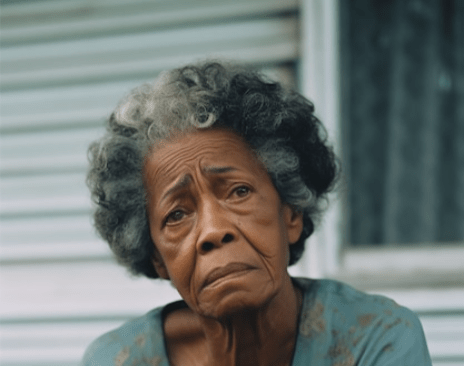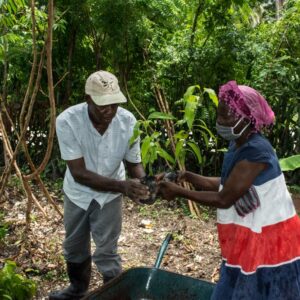Chapter VII
The slaughter
“No country has ever risen without purifying itself in the fire of suffering.” (Gandhi)
Déronette opened the main door of the three-room cottage she shared with Davius and the four kids. Like a Dziga Vertov camera panning, her sleep-heavy eyes scanned the still-night sky. Every day, except Sundays, Darius’s concubine kept the habit of getting up early and she would go and prepare goat’s milk coffee for godmother Cira and her man who was going to the fields in Sarazin, a rural town about fifteen kilometers from Hatte Rocher. One morning in August, while Déronette was heading towards the pile of bundles of branches kept for lighting the wooden fire that was used for daily cooking, it was then that she noticed a paradoxical, unusual, unusual phenomenon: a big white cat crossed the courtyard performing a sort of Maccabean dance; One would have thought that the strange animal was suffering from hyperesthesia. The impressive beast slipped through the fence and disappeared into the wild. It had vanished into thin air. No one had ever noticed such a monster in the vicinity of La Hatte Rocher. The couple, deeply surprised, emotional and upset, reported the matter to the queen of the voodooists. Godmother Cira had immediately spoken of a bad omen for the inhabitants of the region.
“In mystical language, the owl, the dog, the white cat, all three, symbolize death,” she said.
The priestess urged her countrymen to be vigilant:
“Prepare yourselves, my children, to live through painful moments, difficult days, and even periods of great turmoil. Be strong and courageous! The “loas” will not abandon us. The “mysteries” will show us the path to deliverance.”
The citizens kept shouting in unison, “Ayibobo! Ayibobo!” Godmother Cira invoked the African divinity Ogoun Feray who, according to her, could grant his grace and protection to the initiates and to the threatened zealots.
«Ogoun Feray
Triumphant Warrior
The Yoruba of Togo
And from Benin
Like our mothers and fathers
On the night of August 14, 1791
We invoke
Your strength and power
To defeat our enemies
Coming from the other side
From the upset shore
Ogoun Feray
Brother of Shangô
Spirit of the Nagos
From petro
You’re on the road
Spirit of Fire
And of war
Protector of the weak
And the brave
Take your invincible saber
Walk before your maids
And your servants
Help us fight
The forces of darkness
And to conquer
The evil “spirits”…”
The sect’s followers had taken up the chant together: “Ayibobo! Ayibobo!” They knelt with open arms and intoned refrains composed of confused, nebulous and stringy words, which evoked Ogoun Feray.
Thirteen days after this bizarre observation that the peasants had demonized, the children of Achlys, armed to the toes, led by Admiral Caperton, were preparing to phagocytize La Hatte Rocher and its inhabitants. In groups of nine, they began to comb the small houses, looking for objects dedicated to the veneration of the gods and goddesses of voodoo. The Ostrogoths had swept through La Rosée like Galahad and its murderers on Camelot, the legendary kingdom of King Arthur of Pendragon. They destroyed and burned everything in their path.
The rustic soldiers had been guided by a few samples of individuals from the rural lumpen proletariat, ignorant and naive, who did not bother with any feeling of patriotism. These few rural philistines, without conscience, instinctive, mechanical, would have sold all the members of their family to pocket a few piastres. Wasn’t it always like that? Universal history is paved with acts of heroism and acts of treachery. Only, heroes disappear in glory and honor, traitors die in shame and contempt. This is what perhaps made André Malraux say: ” The tomb of heroes is the heart of the living.»
The major and the junior officers, followed by the grivetons, crossed the main entrance of La Rosée. They had pertinent information on the exact place where the voodoo ritual in honor of the god Azaka, protector of fields, crops and livestock, was going to take place. This divinity fertilizes the earth and “prosperes” agriculture. Godmother Cira raised her two arms in the air and went to meet the “herd” of savages, fiercely armed against the peaceful peasants. Peaceful, harmless and defenseless compatriots.
The guardian of the mystical places had suddenly become ” The mother ” in Gorky’s novel. Despite the obviousness of the perilous threats, the guardian of the cult of the orishas did not let herself be frightened. The presence of the malevolent had not inhibited her.
“– You have no right to desecrate the temple of the “mysteries” of Africa. The “loas” will not be happy. They will curse you until the last generation. The country that sends you will be destroyed by Shangô, the orisha of lightning and thunder, who presides over the natural elements. Your nation will be defeated by Ogoun-Badagri, the invincible warrior of the voodooists. His sword will be merciless and it will slay the persecutors of our people. Write it on your chest: “Time will not save you from this prophecy.” I am Cira, the old spiritual woman of La Hatte Rocher, the sacred priestess of L’Habitation La Rosée, the legitimate representative of the orishas of the Yoruba religion. Godmother Cira has spoken…!”
The mercenary leader, Major Derek Bush Cauvin, a bestial, hateful, repulsive, unreasonably irreverent humanoid, replied with his disdainful, segregationist insolence:
– Go to the Hell, old witch! (Go to hell, you old witch)
Without the slightest hesitation, Major Derek Bush Chauvin – that sort of John Clarence Woods who was both a sergeant and executioner in the Third Army of the United States during World War II – plunged his saber, which sparkled under the rays of the burning sun, into the abdomen of Godmother Cira, and he ravaged her guts with rage. The entire landscape began to swirl around the septuagenarian. The fruit trees and the ajoupas, like the “drunkards of the suburbs” of Émile Zola, no longer stood still. The mountain that the poor old woman stared at in the distance through the smoked glasses she wore to reduce the effects of cataracts advanced and retreated like miniature toys, operated by electric batteries. The sky seemed to her to be getting closer to its antonym. Her spirit was slowly detaching itself from the body she had just offered, like Joan of Arc, Sanite Belair and all the other martyrs, as a sacrifice to her country of 27,750 square kilometers occupied at the beginning of the 20th century by the greatest military power in the world. Cira was not a Melba Hernández or a Celia Sánchez Manduley of the Castro revolution. Nevertheless, a heroine in her own way, she had agreed to defy the couriers of death to protect, defend and preserve the practices that invigorated the rhizomes of her cultural traditions. Cira’s soul was already beginning the process of divorce from matter. The “mambo” nevertheless kept her eyes open on the amphitheater of tragedy. Despite the acuteness of her pain, the great lady raised her head and fixed her gaze, filled with gentleness and serenity, without a particle of hatred, on her executioner. There was no room in the heart of this angelic and good-natured creature for evil, hateful and vindictive thoughts. And even in the face of this young and cynical torturer, whom his Socratism of death had made haggard and ashamed, her sacred mouth still managed to avoid linguistic expressions of cursing, imprecation, execration… Despite the mystical powers of which she was the legatee to the Habitation La Rosée, she had not asked the ” mysteries ” to avenge her. To distribute cardse bad luck to the ” malotrus ” by Woodrow Wilson, for the extreme misfortunes they were inflicting on his country and his village, for the untranslatable, unspeakable and unspeakable suffering they were inflicting on his compatriots and his family. The idea of dying like the cows in the slaughterhouse had even sobered him up. ” Eli, Eli lama sabachthani ” cried Jesus of Nazareth on the cross planted on the summit of the “Place of the skull” known rather under the name of Golgothato overcome the pain that her perforated ribs, her tapped hands and her feet twisted by the legionnaires of Rome sent back to her. Godmother Cira herself learned to keep quiet. Swallowed the words that could denounce and accuse her carnal weakness in front of the “cocaine-addled” wild beasts. To accept dying is to submit to the accomplishment of one’s destiny, like Jesus, Socrates, Cicero, Thomas More, Miguel Hidalgo and all the others. The French geneticist Albert Jacquard would recall years later that ” beauty only exists through the existence of ugliness. » Clearly, good itself would only have reason through the reason of evil. And godmother Cira knew it, this breath of life did not belong to her. Nor was it comparable to an object of value pledged in exchange for a loan, on which interest and capital had to be paid, in order not to lose it. It could be taken back without notice at any time.
How old could this rookie be, tied up like a swamp crab in the uniform of the Eagle of the North, who had taken upon himself the responsibility of terminating the life contract that bound Cira from the earth, where she had been born, had grown up and aged, to the “Creator” who had placed her there? Godmother Cira curled her lips and heroically ate her pain. She kept her two hands clasped and her eyes now half-closed. The beads of sweat that beaded on her two cheeks announced the imminent arrival of the end. The Empress of La Hatte Rocher did not give in to the phobia, and she did not bend under the weight of the ordeal. The priestess felt in her belly the burns of a devouring flame, the blaze of an inextinguishable fire. The gash tore her guts apart. The degree of unbearability of the torture could be gauged from his decomposed, sagging jaws, suddenly distorted by a shooting pain. His legs grew weak. The ” things » by La Hatte Rocher offered the pathetic, heartbreaking spectacle of a worn-out, exhausted mule that was on the point of collapsing, before breathing its last.
«Oh! Legba!
Open the way before your servant…
Open the road to Guinea for your horse…!”
The reddish liquid trickled down her white taffeta dress. Her guts hung over her stomach. It looked like a bride’s bouquet. Blood clogged her throat. She didn’t cry out. The fog grew thicker and thicker every time she tried to open the door. to look around to store in her almost extinguished brain, the scene of horror of this day of descent into hell. And there, sincerely there, she could not help but release the last drops of her tears.
Like a nocturnal monster hungry for fresh flesh, the “White” assassin violently tore off the skirt of the little victim. Her name was Gina. But for him, she had no name. She had been wearing her fifteen years, until then, in a healthy body. But for the cad, she had no age. Only round buttocks, well molded in the envelope of innocence. Gina was Helen in the land of broken hearts and fiddled with African legends. A pure beauty let loose in the wild, defenseless, among the orange trees, the coconut trees, the palm trees that pierced the firmament and the flowering mango trees. Like Iphigenia, she was going to be sacrificed on the altar of Artemis. The powerful hands of the salacious scoundrel unfolded the stiffening legs of the adolescent who continued to struggle desperately. The demonized thug, the possessed scamp climbed on his breathless prey and plunged into it with uncontrollable rage. The moans of foul and unhealthy relief rose up to the dense foliage of the mapou. Tears formed of a bizarre mixture of blood and sperm gushed from the fragile, badly damaged sex of the child and flowed onto the hard earth like spring dew. The rape took place between two corpses decapitated by Derek Bush Chauvin, the commander of the criminal garrison…
Gina leaned on her trembling elbows. Sore… The little victim tried in vain to straighten up. Her panicked, hurt, humiliated, degraded, desacralized gaze… discovered the wriggling and dying silhouette of her grandmother Cira.
In fact, Alcindor had named his daughter Ocira, after her old mother, a courageous peasant woman who weeded fallow land, weeded, plowed, dug from morning to night, from night to dawn, to raise and feed eleven fatherless children all by herself. Ocira swore to the paralyzed Manes, nailed to his deathbed, that no other human hands would ever cross the boundaries that led to the sacred garden of her impregnable intimacy. Godmother Cira proudly bore her heritage. Her name carried expressions that gave men and women a dimension of grandeur and nobility capable of covering the entire universe. Struggle, courage, loyalty, pride, sincerity, solidarity, patience, wisdom, generosity: this name embodied all these virtues and qualities for the rural population. Moreover, the villagers affectionately nicknamed her Godmother Cira: a vibrant testimony of respect, love and loyalty towards a stoic woman with a tender heart, an accomplished philanthropist, who cultivated until the hour of her death the seeds of hospitality and mutual aid.
Since the drowning of Joanis and their only son Philemon, godmother Cira had devoted herself to her vocation of faith, a voodoo priestess, and to the education of her granddaughter Gina. The two men, father and son, had gone fishing for lobster on the high seas and never returned. The ocean was angry that night. Bad weather had surprised them offshore. Despite the many sacrifices offered to the gods of the sea, “master Agwe Tawoyo”, the equivalent of Neptune and Poseidon, respectively in Greek and Roman mythology, the bodies never rose to the surface.
The burning houses were spitting fire like Mount Pelée in Martinique. Gina let out a panicked scream. Then her head exploded like a pumpkin thrown from a helicopter. The sated rapist fired three more shots at the motionless body of the half-naked teenager, her white lace panties wrapped around her right thigh. The man with the rank of corporal in the occupation army pissed on the corpse, before joining the rest of the helmeted and booted mercenaries.
The radiant stars of life went out and quickly moved away from the amphitheater of madness. A Neronian madness, one might say. Rome, watered with blood and sperm, burned under the applause of the sons of Persephone and Hades. The flowers of the mourning valley released their perfume to embalm the innocent remains. The joyful songs of the hummingbirds became sorrow, sadness, affliction… The coconut trees, the palm trees, the orange trees, the avocado trees, all the inhabitants of the forest uncovered themselves and bent down to the tormented ground to pay a final homage to the incantatory beauty and the resplendent youth. The waters of the silvery river were transformed into a gigantic serpent of abundant tears. The princess of the woods had succumbed to the pedophile sex and the murderous bullets of the civilization from beyond the grave. Long after, Jean Paul Sartre [33] will write about defeated, occupied, humiliated France in ” The Paths of Freedom » : “Everything is permitted!” And Sartre will be absolutely right… Because, it is quite true that, that day, “everything was permitted…!” Up to the heinous murder and the horrible and horrifying rape of childhood.
Inert beauty
Martyrdom of cruelty
The Dew of Freedom
You will see it
Will refresh
Your eternal sleep
Deep in your shroud
You will live beautiful and proud
In the bowels of the earth
Until the century of centuries
Amen!
The shadows of darkness arose and carried the sacrificed body of Gina La Rosée to the bottom of the abyss.
The kid, entrenched behind the bushes on the hillside, watched the bastards’ actions with disgust and anger. Habitation La Rosée gave off a strong smell of smoke and burnt human flesh. The voodoo practitioners were caught in the middle of celebrating their benevolent “deities.” In the middle of a mystical ritual. The entire village gathered there every year to present offerings of thanks to their protective gods. None of the participants escaped. Those who had tried to flee received a shock in the shoulder blades and lungs and they collapsed to the ground like sacks of dried corn. The genocidal forces, their cheeks gray with smoke, contemplated their criminal works. They had learned the art of killing. True professionals in the destruction of lives, countries and property. Jackals without hearts and without souls. Murderous robots programmed to sow mourning, heartbreak, languor and desolation across the universe. In this serious context of seasoned madness and outrageous inhumanity, death could even serve as extreme amusement through the cruel and senseless game of Russian roulette. And it was still and always on the brains of the destitute, – The Viet Cong would later testify to this. –, that the bets were open. The herd of wild animals turned their backs on the suffocated, half-frightened boy to move away from the immense scene of carnage. The little Capois shivered under the impulses of his explosive rage. A state of irascibility that sent him crazy to the gates of fatality. His pride and dignity sparkled. He was only nine years old. But age mattered little…! African blood flowed in his veins. The boy emerged from the shells of his fright, rushed down the slope at full speed, picked up the dagger that was lying in the dried grass and planted his weapon of vengeance in the right lung, then in the neck of the Yankee assassin. Corporal Andrew Paterson wrapped his body in his arms, twisted, broke in two and bit the dust screaming. The resistance fighters turned around and the little vigilante succumbed to a hail of projectiles. The corporal wriggled for a few more seconds like a pig being slaughtered in the Similien butcher’s. And nothing more! The day was turning white with the light of a merciless slaughter.
“This century is such a tragic sky where shipwrecks
Seems written in advance…
……………………………………………………..
I admire your destiny, I love it, all in tears
For your mother’s tears,
God who made you die, handsome prince, under arms
Like a Homeric hero.
(Verlaine)
The gentle wind dropped a few dead leaves on the boy’s corpse. Godmother Cira, lying on her back, her two arms stretched out on the powdery ground of her joyful childhood, witness to her nubility, was waiting carefully for her moment. The old lady no longer belonged to this poor but picturesque region, where life, before this fatal moment, flowed like a limpid source of love and solidarity between the inhabitants. The cavernous sniggers of the “big white” seemed more and more distant. Invisible bells suddenly began to ring like chimes. And their echo, spread across the earth, was gradually transformed into a moving funeral march. Nature, it seemed, had entrusted the great musical composer Hector Berlioz with the mission of performing ” The Great Funeral and Triumphant Symphony ” to mark, and above all to perpetuate the extraordinary passage of Cira La Rosée on the lands of the Arawaks, the Tainos, and the Kalinagos. A multitude of angelic voices came to mingle with the melodious sound of the immaterial orchestra. The canticle, which gave the “spirits” shivers, grew louder in the misty sky, frozen in its costume of procrastination. And it never stopped. We heard in turn ” The twilight of the Gods » by Richard Wagner, « The Funeral March » by Edvard Grieg, dedicated to the memory of Rikard Nordraak, « the funeral ode » who accompanied the coffin of Queen Mary II of England to Westminster Abbey, and again… The tearful clouds filed past Cira’s remains and stopped there for a few seconds to bend their knees in respect and farewell. The “mysteries” of Guinea, themselves confused, had come out of the secret places to accompany their faithful servant to her final resting place, in the invisible kingdom of the divinity Mahou.
In the absence of living Christians, it was the elements of nature that took charge of paying this final homage to the “high priestess” of noble blood, on the occasion of her perpetual journey.
Godmother Cira gave the example of a woman who knew how to die. Not one of those little black women with crotches soiled by the jet of shame who coo to obtain the favor and benevolence of the master. Not one of those little black women who proudly dragged the shame of Kizzy [34] through the village. This great lady descended from a line of chivalrous creatures. Racialized women and men, willing to “live free or die” rather than lick the soles of the colonizing boots: the fierce descendants of those who had arrived in 1492 with their bags full of poverty, crosses and swords, and who had left with their hands full of gold, cotton, indigo, sugar and tobacco; their bellies sated with cocoa, bananas, coffee… and their sex intoxicated, drunk with carnal pleasure. Those who have developed the unfortunate habits of searching everywhere in the land, of defiling women and girls, of subdividing territories, of dividing peoples, of polluting seas, rivers, streams, lakes and ponds, of cutting down trees, of destroying fauna and flora, of atrophying plants, of amputating limbs, then of abandoning their victims in the torrid desert of moral weakening, physical decay and ruinous bankruptcy…
Let this Bossuet be anathema ten thousand times over. [35] who wrote nonsense against blacks!
« To abolish slavery would be to condemn the Holy Spirit, who orders slaves, through the mouth of Saint Peter, to remain in their state and does not oblige masters to free them..»
And that hypocrite Choiseul [36] :
« The slave trade deserves more protection than any other, since it is the primary motive for cultivation. »
May all the foul-mouthed Savarys be cursed a hundred thousand times over. [37]!
« These poor people are idolaters and Mohammedans. The Christian merchants, by buying them from their enemies, get them out of a cruel embarrassment.»
May the devouring fires of their hell consume them eternally! Without excluding from the lot the negrophobes and the slave traders, those vile characters who declared to Urban VIII [38] :
« The surest way to bring about the conversion of the Negroes is to enslave them, because the Negroes, being idolaters, have no right to liberty..»
Were they really more uncivilized than those steel-hearted “whites,” those defenseless individuals whom the greedy colonists wickedly tore from their ancestral land, and whom they sold like cattle in the public square, and even on the steps of Catholic churches? The cads raped the mothers and daughters on the dry straw of their attics filled with the blood and sweat of Africans and Indians. “What civilization? I ask you, gentlemen…. In those conditions, would it not have been better for the Negroes, – as you call us –, to remain savages and die in Africa…?” Aurelus was not a famous philosopher of Antiquity or of the Renaissance, but in truth, Plato [39]Homer [40]Demosthenes [41] and all the other great and illustrious thinkers could not have said it better. The reminiscence of great philosophical thoughts necessarily contributes to intellectual transcendence, moral greatness, and the cultural and religious emancipation of the being. However, in the customs of Afro-descendants, proverbial expressions remain a source of enriching popular philosophy. And the old crippled guerrilla knew how to use them wisely, when he described complex life situations, reported events that had probably left indelible marks on his brain. When Aurélus died on the morning of the national independence day, the 1is January 1951, the entire village was drowning in torrential tears of mourning. Lucia was determined to respect the deceased’s last wishes at all costs. “The body will be buried directly on the top of the hill where Vaillant rests,” she reminded them.
Vaillant was the name of Aurélus’ black horse. How many times had he not saved his master’s life? Vaillant did not like the Yankees. He had crushed and killed a good twenty of them by himself. Valiant, neighing like a champion of the racecourse, marched on the heads of the arrogant invaders. Lucia, battered and tormented by grief, did not long survive her man. One night when the moon was stingy with its light, the poor widow fell unconscious from her old dodine. The peasant comrades had tried in vain to revive her. Her heart, worn out by the hassles of wasting and by her state of lypemania, stopped beating forever. Lucia no longer belonged to La Hatte Rocher. Her soul had gone to join Aurélus in the kingdom of the invisible in Ouidah. Before crossing the borders of death, she had repeated several times the names of Richmond and Aurélien, her dear children who had left for Cuba for the zaffra, who had not returned to La Hatte Rocher, and whom she would never see again. Lucia had worked like a beast of burden for the Corbins to raise her two boys. Aurélus, the good-natured concubine and responsible father before his tragedy, was no longer of much use. He had become a decrepit cripple, because of the injuries he had inflicted on his legs during the war of the cacos against the United States Marines. Fifteen kilometers on foot every morning on the way there, and the same amount every evening on the way back, for three hundred and sixty-five days, and for twenty-three years, all this had ended up deteriorating his poorly maintained health.
“I saw the birth of “mistress” Venus, I saw her take her man…”
When Lucia spoke of the Corbin’s daughter, her face lit up with joy. And so to speak, these were the only times when one could notice flashes of smile sculpting her tired cheeks. The other time, exceptionally, was when she explained to her sons why their grandmother had chosen to call their uncle Assé. She wanted to express her contempt for the government of Tiresias Simon Sam [42]. This name given to the child was a disguised cry of revolt against tyranny, the pillaging of the public treasury and the famine that was affecting the whole country. Assé found himself in the same cell as his brother-in-law Aurélus, before the latter was sent to the mountains with the other cacos. Two Yankees had come to get Assé in the middle of the night, and they had never brought him back. Aurélus had immediately understood that it was because of the incident the day before.
“In his place, I would have done the same thing,” Aurelus always remarked. “Shit,” the old man shouted! “Leave a colon pig “slap you with his dirty hands, without you reacting? Oh, no! Although the mistreatment had transformed him into a hake, Assé was not a comrade to let himself be done. So, he had done something. He had done what was necessary to restore the honor of the family and maintain the admiration of his comrades. He spat in the officer’s face. Assé received an even more violent “slap”. He threw his spit with more force, considering that his arms were not free, that they were tied with handcuffs that cut his wrists. Fifteen slaps, fifteen balls of spit well sent to the face of the angry officer…”
Aurelus was right. The arrogant Yankee had indeed settled his account with his brother-in-law. He executed him himself with a bullet to the head, as was customary in that era of occupation and barbarism.
If it hadn’t been for that bad flu and that damn fever, Lucia would have stayed longer with the Corbins. So it had taken her being sick for a single day for her to be abruptly thanked for her services. Fired. Replaced without the slightest burst of gratitude. Without a shred of consideration. And even if others would have spoken of pity…! Monsieur Fabrice Corbin had abandoned her like that, after twenty-three years and twelve days that she had spent in the service of this ungrateful, hypocritical family, and wilfully forgetful of the good deeds of others. For the first time in all these years, Lucia noticed how long, painful and difficult the journey had been to access. For the first time in twenty-three years, she was in no hurry to return home to her husband Aurélus and her boys, Richmond and Aurélien, whom she was fond of and whom she called with an air of pride the two “bearers of the head of her coffin”…
“Ah! The bourgeoisie,” she moaned all the way, “they have no pity for anyone. To abandon you like this after you have spent all these years feeding them, washing their clothes, cleaning their children’s behinds, dusting their furniture… it’s hardly believable!”
With a daily income of fifteen cents, it was impossible for Lucia to send her children to open their eyes at Master Timocles. Nor did she want to place them as servants with the notables of the City of Independence, who were the equivalent of the practitioners of ancient Rome.
Robert Lodimus
The Blood of ProphecyromanProchain extrait: Letters
Similar articles






